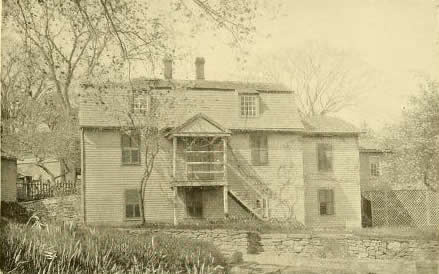Diah Manning House circa 1750
85 Town St Norwich, CT
Please note, this is a private residence and is in the process of being rehabilitated
The c. 1750 Diah Manning House located at 85 Town Street is listed on the National Register of Historic Places. The home is located in the Norwichtown Local Historic District and the house is in the Colonial and Georgian architectural style with a center chimney and is a 1 ½ story gambrel.
The home was built c. 1750 by Samuel Manning. After Manning’s death in 1783, the house passed to his widow Anne, daughter Eunice, and his son Diah Manning. The shop and garden were left to his other son, Roger Manning. The home’s most prominent occupant was Diah Manning who served in the Revolutionary War as a Drum Major. Diah Manning and his brother, Roger, were the handpicked bodyguards of George Washington at Valley Forge in 1778. Roger Manning served in Colonel Israel Putnam’s regiment and Diah Manning served in Norwich’s Colonel Jedediah Huntington’s regiment. Reputedly, Diah Manning was said to have brought Major John Andre his last meal on the morning of October 2, 1780, the day he was executed as a spy.
After the war, Diah served for many years as the bell ringer for Norwichtown and sexton for the First Congregational Church. During the Haitian Revolution in the late eighteenth century, the Manning family housed Haitian prisoner and refugee, Jean Pierre Boyer, in their home from 1800-1801. According to local historian Mary Perkins, “the Diah Manning Family were extremely kind in their attentions to a young Haytien… Jean Pierre Boyer.” Years later, Boyer went on to serve as President of the Republic of Haiti from 1818–1843. While president of Haiti, Boyer successfully reunited the north and south section of Haiti and annexed Santo Domingo which brought all of Hispaniola under one government. Local Historian Frances Caulkins said that nearly twenty years after Boyer left Norwich, “President Boyer…made inquiries of his…former friends and send a handsome gratuity to the two families in which he had been treated with special kindness.” He gave $400 to the widows of Consider Sterry and Diah Manning. Unfortunately, the Haitian economy failed to thrive under Boyer’s presidency. The poor economic conditions and the corruption within his government forced Boyer to leave Haiti and live out the remainder of his life in exile in France.
In addition to the rich colonial era history, the Diah Manning House was the residence of the local Figarsky family for four generations and has incredible sentimental value to the family. The structure does retain some elements from the eighteenth century, most notably, the paneling in the living space, doors, hinges, and beams. The home was added onto in the late nineteenth century and has an early twentieth century garage on the property.


